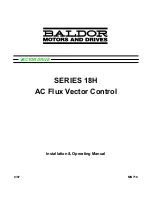
NOTE:
It is our policy to continually improve products and as such we reserve the right to alter data, specifications and component parts without prior notice.
IMportant:
no liability is accepted for incorrect use of this product.
warranty:
Guarantee is 12 months from purchase date, proof of which will be required for any claim.
sole uK distributor, sealey Group.
Kempson Way, suffolk Business Park,
Bury st. edmunds, suffolk.
iP32 7Ar
www.sealey.co.uk
01284 757500
01284 703534
web
6.6.
connecting equipment to the generator
6.6.1.
Connect the equipment you want to use to the 230 V~sockets, see fig.1.3.
Important:
these sockets may be loaded continuously (s1) with 2600W and temporarily (s2) for a maximum of 2 minutes with
2800W.
6.6.2.
the generator is suitable for 230 V~ Ac appliances.
6.6.3.
Do not
connect the generator to the domestic power network as this may result in damage to the generator itself or to other electrical
appliances in your home.
note:
Some electrical appliances (power jigsaws, drills, etc.) may have a higher level of power consumption when used in difficult
conditions.
6.7.
Switching off the engine
6.7.1.
Before you switch off the generator, allow it to run briefly with no consumers so that it can “cool down”.
6.7.2.
Move the ON/OFF switch, see fig.1.10 to position “OFF” with the key.
6.7.3. close the petrol tap.
6.8.
Overload cut-out 2 x 230 V socket-outlets
Important. The generator is fitted with an overload cut-out.
This shuts down the sockets, see fig.1.3. You can restart the sockets
by pressing the overload cut-out, see fig.1.5.
Important! If this happens, reduce the electric power you are taking from the generator or remove any defective connected
appliances.
7. MaIntenance
note:
switch off the motor and pull the spark plug boot from the spark plug before doing any cleaning and maintenance work on the
equipment.
Important:
switch off the machine immediately and contact your sealey dealer:
in the event of unusual vibrations or noise
If the engine appears to be overloaded or misfires
7.1.
cleaning
7.1.1.
Keep all safety devices, air vents and the motor housing free of dirt and dust as far as possible.
7.1.2.
Wipe the equipment with a clean cloth or blow it with compressed air at low pressure.
7.1.3.
We recommend that you clean the device immediately each time you have finished using it. Clean the equipment regularly with a moist
cloth and some soft soap. do not use cleaning agents or solvents; these could attack the plastic parts of the equipment. ensure that
no water can seep into the device.
7.2.
Air filter see figs 11 & 12.
7.2.1.
Clean the air filter at regular intervals, and replace it if necessary.
7.2.2.
Open both clips, see fig.11.A and remove the air filter cover, see fig.11.B.
7.2.3.
Remove the filter elements, see fig.12.C. Do not use abrasive cleaning agents or petrol to clean the elements. Clean the elements by
tapping them on a flat surface. In cases of stubborn dirt first clean with soapy water, then rinse with clear water and air dry.
7.2.4. Assemble in reverse order.
7.3.
Spark plug see fig.13
7.3.1.
check the spark plug for dirt and grime after 20 hours of operation and if necessary clean with a copper wire brush. thereafter service
the spark plug after every 50 hours of operation.
7.3.2. Pull off the spark plug boot with a twist.
7.3.3.
remove the spark plug with the supplied spark plug wrench.
7.3.4. Assemble in reverse order
7.4.
Changing the oil and checking the oil level (before using the machine) see fig.10.
7.4.1.
the motor oil is best changed when the motor is at working temperature.
7.4.2.
only use motor oil (15W40).
7.4.3.
Place the generator on a slightly inclined surface so that the oil drain plug is at the lower end. Open the oil filler plug. Open the oil
drain plug and let the hot engine oil drain out into a drip tray.
7.4.4. After the old oil has drained out, close the oil drain plug and place the generator on a level surface again.
7.4.5.
fill in engine oil up to the top mark on the oil dip stick (approx. 0.6 ltr).
Important:
do not screw the dipstick in to check the oil level, simply insert it up to the thread.
7.4.6. dispose of the waste oil properly.
7.5.
Automatic oil cut-out light/switch see fig.3.9 & 3.9A
7.5.1.
the automatic oil cut-out responds if there is too little oil in the engine. in this case it will not be possible to start the engine or it will cut
out automatically after a short period of time. it cannot be started again until the engine oil has been topped up, see 7.4.
environmental protection
recycle unwanted materials instead of disposing of them as waste. all tools, accessories and packaging should be
sorted, taken to a recycling centre and disposed of in a manner which is compatible with the environment.
When the product becomes completely unserviceable and requires disposal, drain off any fluids (if applicable)
into approved containers and dispose of the product and the fluids according to local regulations.
Original Language Version
© Jack sealey limited
G3101 | issue 2(sP)- 08/11/16























